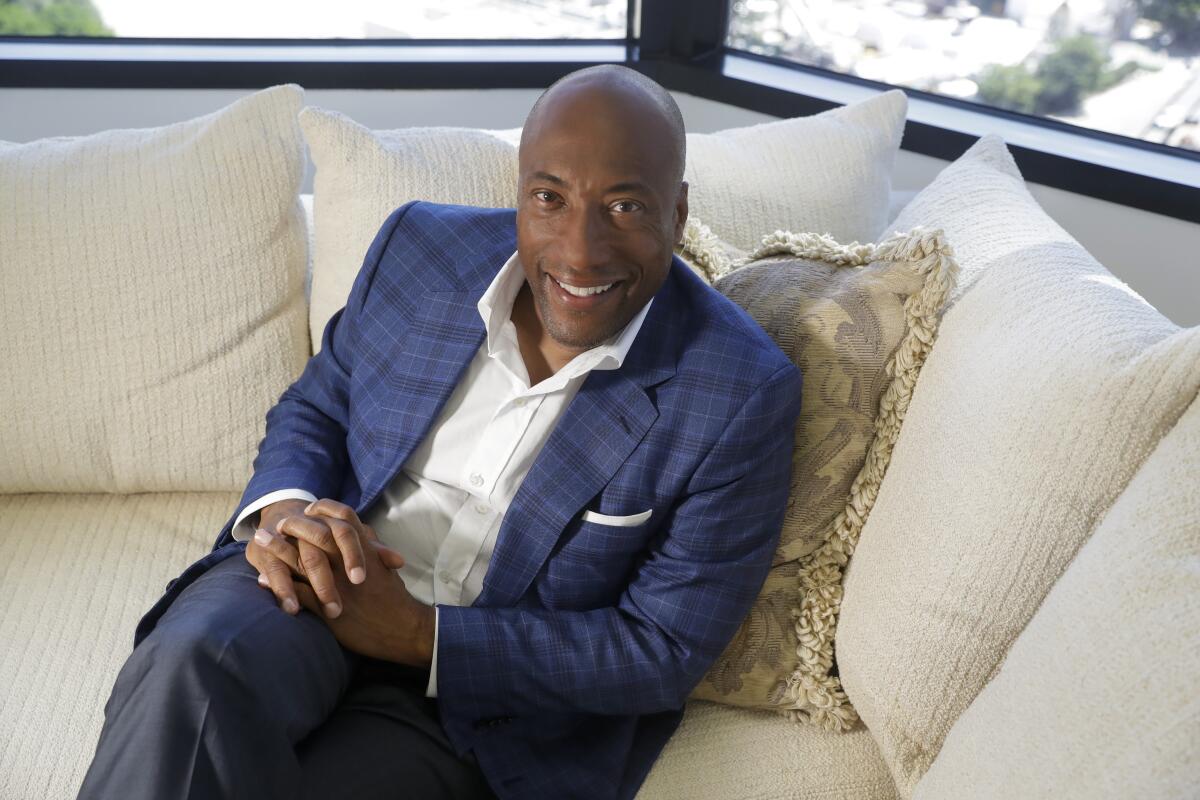Byron Allen, Comcast settle long-running battle over alleged racism

Los Angeles media mogul Byron Allen has ended his high-profile legal battle over alleged racism by cable juggernaut Comcast Corp. after a five-year campaign that reached the U.S. Supreme Court.
Allen has long maintained that Philadelphia-based Comcast refused to offer his TV channels in its cable bundles because he’s Black. His suit, filed in 2015, sought $20 billion.
Comcast has denied the allegations.
But with the settlement, announced Thursday, Allen achieved his goal by gaining carriage for three of his cable channels — Comedy.TV, Recipe.TV and JusticeCentral.TV — on Comcast’s Xfinity cable television packages. Comcast also agreed to extend the distribution deal for the Weather Channel, which Allen acquired in 2018, and 14 broadcast stations that Allen owns.
Financial terms were not disclosed.
“We’re excited to begin a new phase of partnership with Comcast and Xfinity, including the distribution of our cable channels for the first time on Xfinity platforms,” Allen, the founder, chairman and chief executive of Entertainment Studios/Allen Media Group, said in a statement. “I am very happy with the deal and Comcast and I look forward to a mutually-rewarding, long-term relationship.”
The settlement, announced Thursday, comes amid a reckoning by entertainment and media executives over whether they have been complicit in perpetuating racism in America. The police killing of George Floyd in Minneapolis has prompted huge protests in most U.S. cities centered on calls to end systemic racism.
Television entrepreneur Byron Allen has filed a $20-billion racial discrimination lawsuit against cable giants Comcast Corp. and Time Warner Cable.
“We are pleased to have reached this multifaceted agreement that continues our long relationship with the Weather Channel while bringing Xfinity customers additional content,” Bec Heap, Comcast Cable’s senior vice president for video and entertainment, said in a statement. “We look forward to an ongoing partnership.”
The deal with Comcast follows the U.S. Supreme Court’s decision in March, which struck down many of Allen’s arguments.
In a 9-0 decision, the court said it was not enough for a civil rights plaintiff to assert that his race was one of several factors that motivated a company to refuse to do business with him. Instead, Allen was told that he must show race was the crucial and deciding factor.
The Supreme Court sent Allen’s case back to the 9th Circuit Court of Appeals, but as part of Thursday’s settlement, Allen agreed to withdraw the case that he filed in 2015.
The lawsuit began after Allen, who owns Entertainment Studios Network, unsuccessfully tried to negotiate with Comcast and Charter Communications for slots on their systems for seven of his channels, including Pets.TV, Cars.TV and Comedy.TV. Both companies expressed some interest, but ultimately said they already carried other similar channels.
When the talks ended with no deal, Allen filed lawsuits in Los Angeles against both companies seeking billions of dollars in damages and alleging racial discrimination. Allen pointed out that Comcast had given slots to lesser-known channels produced by white-owned companies. Allen also alleged a Comcast executive had said, “We’re not trying to create any more Bob Johnsons,” referring to the billionaire African American founder of Black Entertainment Television (BET).
For five years, judges were been split over whether Allen had enough evidence of racial bias to merit a trial. His suit was legally significant because it relied on the historic Civil Rights Act of 1866. Enacted a year after the Civil War, it decreed that Black people “shall have the same right ... to make and enforce contracts ... as is enjoyed by white citizens.”
U.S. District Judge Terry Hatter considered several amended complaints but ultimately dismissed Allen’s suit, saying Allen lacked the evidence to show that racial bias was the reason for Comcast’s decision not to carry his channels.
But the 9th Circuit Court of Appeals disagreed and cleared the way for the suit to proceed. Its judges said that if race appeared to have been a motivating factor, that was sufficient for the suit to proceed. But with its decision, the U.S. Supreme Court put new limits on race-bias lawsuits.
Allen, 59, got his start in show business playing comedy clubs in Los Angeles as a teenager. He made his first appearance on “The Tonight Show” when he was 18. In the 1980s, he was the host of NBC’s “Real People,” but he wanted to own his own business, so he founded Entertainment Studios in 1993. His company has grown into a small media empire, and yet Allen struggled for acceptance.
Comcast faced criticism for its diversity efforts during the federal review in 2010 of its takeover of NBCUniversal. As part of an 2011 agreement with the federal government to allow that deal to go through, Comcast agreed to launch several channels backed by minorities, including the Aspire channel led by former basketball great Magic Johnson, the Revolt channel with music mogul Sean “Diddy” Combs, and El Rey network with director Robert Rodriguez.
Times staff writer David Savage contributed to this report.
More to Read
Inside the business of entertainment
The Wide Shot brings you news, analysis and insights on everything from streaming wars to production — and what it all means for the future.
You may occasionally receive promotional content from the Los Angeles Times.











